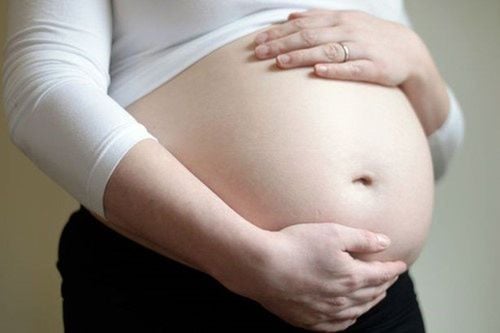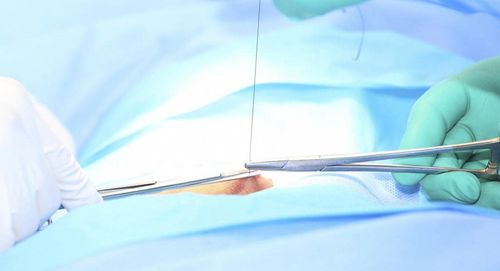This is an automatically translated article.
The article is professionally consulted by Master, Resident Doctor Nguyen Thanh Vinh - Department of Obstetrics and Gynecology - Vinmec Ha Long International General Hospital.
Detecting early signs of severe preeclampsia can help pregnant women get treatment early. Severe pre-eclampsia is one of the five obstetric complications that cause mortality in both the mother and the elderly.
1. Signs of severe preeclampsia
Pre-eclampsia usually has 3 signs as follows:
High blood pressure Starting after 20 weeks of pregnancy may have symptoms of sudden increase in maternal blood pressure protein, systolic blood pressure > 140 mmHg and diastolic blood pressure less than 90 mmHg.
Proteinuria Urinalysis Total urinalysis shows proteinuria > 0.3g/l.
Edema Full body edema.
Edema is not a serious sign of preeclampsia. Preeclampsia when the following symptoms need to be monitored are severe preeclampsia:
Headache, dizziness, dizziness. High blood pressure ≥ 160/110 mmHg. Urine output in 24 hours is less than 400ml. There are more than 5 grams of Albumin in the urine in 24 hours. Headache, dizziness, dizziness repeat. Headaches with pain relievers that don't help. It should be differentiated from headaches from other causes. Epigastric pain, feeling of suffocation, heaviness in the chest, acute pulmonary edema, heart failure. In severe preeclampsia, fetal ultrasound showed fetal growth retardation in utero, liver function tests decreased with manifestations: decreased platelets, elevated liver enzymes, elevated blood creatinine.
Severe preeclampsia can lead to the acute complication of eclampsia, with convulsions and coma. In addition, during pregnancy-related seizures, prior relevant evidence must be available to change the diagnosis of eclampsia.
The convulsion is described as follows: begins with facial tremors, then a few seconds full body muscle contractions leading to whole body spasms, this condition lasts for about 15-20 seconds, jaw suddenly opens and closed very strongly, and then the eyelids repeated the same situation. The facial muscles and all other muscles take turns to relax very quickly.
The mother may fall off the bed, may bite her tongue due to uncontrolled movement of the jaw, this period of muscle contraction can last for 1 minute. Gradually the muscle movements became weaker, and finally the mother became immobile. You may then stop breathing for a few seconds, then take a deep breath and go into a coma. The mother after awakening will not remember the seizure nor the events before and after the seizure.

Sản giật gây những cơn co giật nguy hiểm
Thus, the progression of pre-eclampsia is to go into eclampsia, which is a very dangerous condition that can threaten the death of mother and child. The 3 symptoms of HELLP syndrome include elevated liver enzymes, hemolysis, and thrombocytopenia. Pathologies and complications caused by HELP syndrome are disseminated coagulopathy, acute pulmonary edema, acute renal failure, placental abruption, cerebral hemorrhage...
2. Treatment of severe preeclampsia
Early detection and thorough treatment of preeclampsia is the most effective way to end it to benefit both mother and child, avoiding dangerous complications later.
In the case of mild preeclampsia, preterm pregnancy, a qualified, knowledgeable mother can self-monitor at home. Review once a week. At the hospital should do tests, liver function, blood chart, kidney function, complete coagulation test, blood group and urinalysis. Obstetric monitoring, Doppler fetal ultrasound, manual fetal movement monitoring.
At home, measure blood pressure twice a day in the morning - afternoon, record measured parameters, monitor pregnancy, weight, lie down completely, do not work.
When the following severe signs are present, they must be examined immediately: dizziness, headache, blurred vision, rapid weight gain, fetal weakness, epigastric pain, high blood pressure, little urine, dark urine.
With severe preeclampsia, the doctor may use antihypertensive drugs such as Trandate, Adalat Retard or Aldomet. Ensure to maintain blood pressure between 130/80 - 140/90 mmHg.
Prevent seizures with intravenous magnesium sulfate and intravenous infusion for maintenance.
Assess fetal health, fetal maturity. If the fetus is not mature enough, corticosteroids can be used to help the fetal lungs be able to adapt to the independent role after birth.
In addition, comprehensive care for mother and baby's health is also very important, with adequate nutrition, quiet room, soft light, vital signs, water intake.
In case of eclampsia, combine resuscitation and seizure termination, remove the fetus immediately to save the mother and fetus simultaneously. The process requires the close support of both the neonatal unit and the anesthesiologist, and the active care team.
3. Prevention of severe preeclampsia
Preeclampsia - eclampsia is quite common with a frequency of 5 - 8% of all pregnancies. The world has been able to predict preeclampsia early as well as provide guidelines for the prevention of preeclampsia in high-risk cases during pregnancy. Currently, Vinmec can detect and screen for preeclampsia by ultrasound and xn. The cause of preeclampsia is due to abnormalities in the infiltration of the placental trophoblastic syncytium, which changes the uterine artery structure, but the mechanism is still controversial.
The best measure to prevent severe pre-eclampsia and complications is to closely monitor the pregnancy, combined with understanding the mother's medical history and well treat the comorbidities, if any, such as diabetes, hypertension, and diabetes. blood pressure, vascular disease. Along with that is improving quality of life and adequate nutrition during pregnancy.

Phòng ngừa tiền sản giật nặng
Every pregnant woman needs knowledge to monitor and detect early signs of preeclampsia - severe preeclampsia through blood pressure changes, abnormality in the presence of protein in the urine to have a good treatment plan right away. from the beginning.
Vinmec International General Hospital offers a Package Maternity Care Program for pregnant women right from the first months of pregnancy with a full range of antenatal care visits, periodical 3D and 4D ultrasounds and routine tests to ensure that the mother is healthy and the fetus is developing comprehensively. Pregnant women will be consulted and checked for health under the close supervision of experienced and specialized obstetricians, helping mothers gain more knowledge to protect their health during pregnancy as well as minimize complications affecting mother and child.
Doctor Nguyen Thanh Vinh has many years of experience in major hospitals such as Hue Central Hospital, Hue University Hospital of Medicine and Pharmacy and is the main doctor who practices medicine at Hanoi Obstetrics and Gynecology Hospital.
Please dial HOTLINE for more information or register for an appointment HERE. Download MyVinmec app to make appointments faster and to manage your bookings easily.













